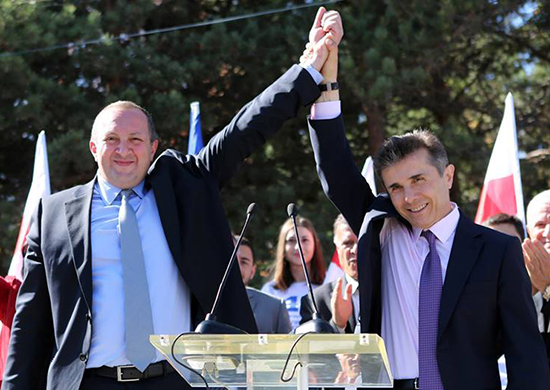Georgia to elect a new president, but real uncertainty over the future role of billionaire PM

24 October, 2013
0
Uncertainty over PM's role after Georgian election
by LYNN BERRY, Associated Press - 24 October 2013 14:42-04:00
TBILISI, Georgia (AP) — After this weekend's election, when Georgia's eccentric billionaire prime minister looks out from his futuristic residence high above the capital, he is all but certain to be the undisputed leader of this U.S.-allied country.
And then, once his chosen candidate is installed as president, Bidzina Ivanishvili insists it will be time to step down.
Ivanishvili, 57, is a lean man who exudes the confidence that comes from a self-made fortune and the belief that he has saved his country from the perceived sins of the outgoing president, Mikhail Saakashvili.
In an interview Thursday with The Associated Press, Ivanishvili insisted that he will not try to run the government of this former Soviet republic from behind the scenes. But as Georgia's richest man, he will retain enormous influence, and how he intends to use it remains one of the biggest questions in the country today.
"Of course I will have influence on politics and the government, as every citizen will, but my influence will be bigger," he told the AP. "But this will be healthy influence, and in no way will it happen from behind the curtains."
Long known only as a reclusive philanthropist, Ivanishvili was propelled into the prime minister's post a year ago when his Georgian Dream coalition pulled off a stunning upset against Saakashvili's party.
For the past year, the two men have shared an uneasy coexistence that will end after Sunday's election of a new president. Saakashvili is not running due to term limits.
Ivanishvili's choice, former education minister Giorgi Margvelashvili, is expected to win the election. And a constitutional change that now transfers most power from the president to prime minister will make Ivanishvili the true leader of Georgia.
The billionaire said Thursday that nothing could convince him to change his mind and stay. He plans to nominate the next prime minister before he goes, but has refused to make his choice public before the election.
"That's the million-dollar question now in Georgia, what he means by leaving," said Elene Khoshtaria, a political analyst at the non-governmental organization GRASS.
Ivanishvili lives and works in a Japanese-designed glass-and-steel complex overlooking Tbilisi, the Georgian capital, where his collections of world-class art and wild animals are on display. In a giant aquarium in the entrance hall, small but fierce-looking sharks swim among other exotic fish.
Ivanishvili made his money in Russia in the chaotic 1990s following the fall of the Soviet Union, raising fears that he would allow Moscow to restore its influence over its tiny neighbor on the Black Sea. Instead, he has kept Georgia firmly aligned with the United States and on the path toward greater integration with the European Union.
But tensions with Russia still throb. Several months ago, Russia began putting up new barbed-wire fences along the line separating Georgia from a breakaway region that fell under Moscow's control after a brief but disastrous war between the two nations. Georgia claims the Russian fences took even more Georgian territory.
Georgians were also angered when a Russian military pilot who had fought during the war took part in the Olympic torch relay this month.
Ivanishvili reiterated Thursday that Georgia might reconsider its decision to take part in the 2014 Winter Olympics in Sochi because of Russia's recent actions.
"I hope that the mistakes will be corrected and we will have the possibility of sending our athletes there, but if we feel that participation will be beneath our dignity, I do not exclude the possibility that we will refuse to participate," he said.
Forbes estimates Ivanishvili's wealth at $5.3 billion, about one-third of the gross domestic product of Georgia, a country of 4.5 million people.
Even if Ivanishvili does not try to maintain his control over the government "we shouldn't forget that he is the leader of the leading coalition and he's the richest person in this country, which makes him one of the most influential," Khoshtaria said.
Despite hopes that Ivanishvili would help jump-start Georgia's economy, GDP growth and investment fell over the past year. Khoshtaria attributed that to uncertainty about the new political structure.
Dozens of Saakashvili loyalists, including his former prime minister and heir apparent, have been arrested in the past year, leading to accusations that Ivanishvili was using the justice system to settle political scores. He denies the claims.
Saakashvili's preferred candidate in the presidential election is David Bakradze, the former parliament speaker, who attracted only about 150 people to a campaign rally Thursday in Tbilisi.
Battling him for second place in the polls is veteran politician Nino Burdzhanadze, who wants to see Saakashvili jailed for the rights abuses that occurred on his watch.
Adding to the intrigue, Ivanishvili's candidate says he will pull out of the race if he fails to win more than 50 percent of the vote. Margvelashvili said this is not a trick but a legitimate effort to get his supporters to the polls.
In an interview with the AP, Margvelashvili promised the Georgian government will work even harder without Ivanishvili at the helm.
"We as a government will become much more active, because we will know that all the successes and failures will be our successes and failures," he said.
_____
AP television producer Sophiko Megrelidze contributed to this report.
News Topics: General news, Government and politics, Presidential elections, State elections, National elections, Elections
People, Places and Companies: Bidzina Ivanishvili, Mikheil Saakashvili, Davit Bakradze, Georgia, Tbilisi, Russia, Eastern Europe, Europe
Copyright 2013 The Associated Press. All rights reserved. This material may not be published, broadcast, rewritten or redistributed.

